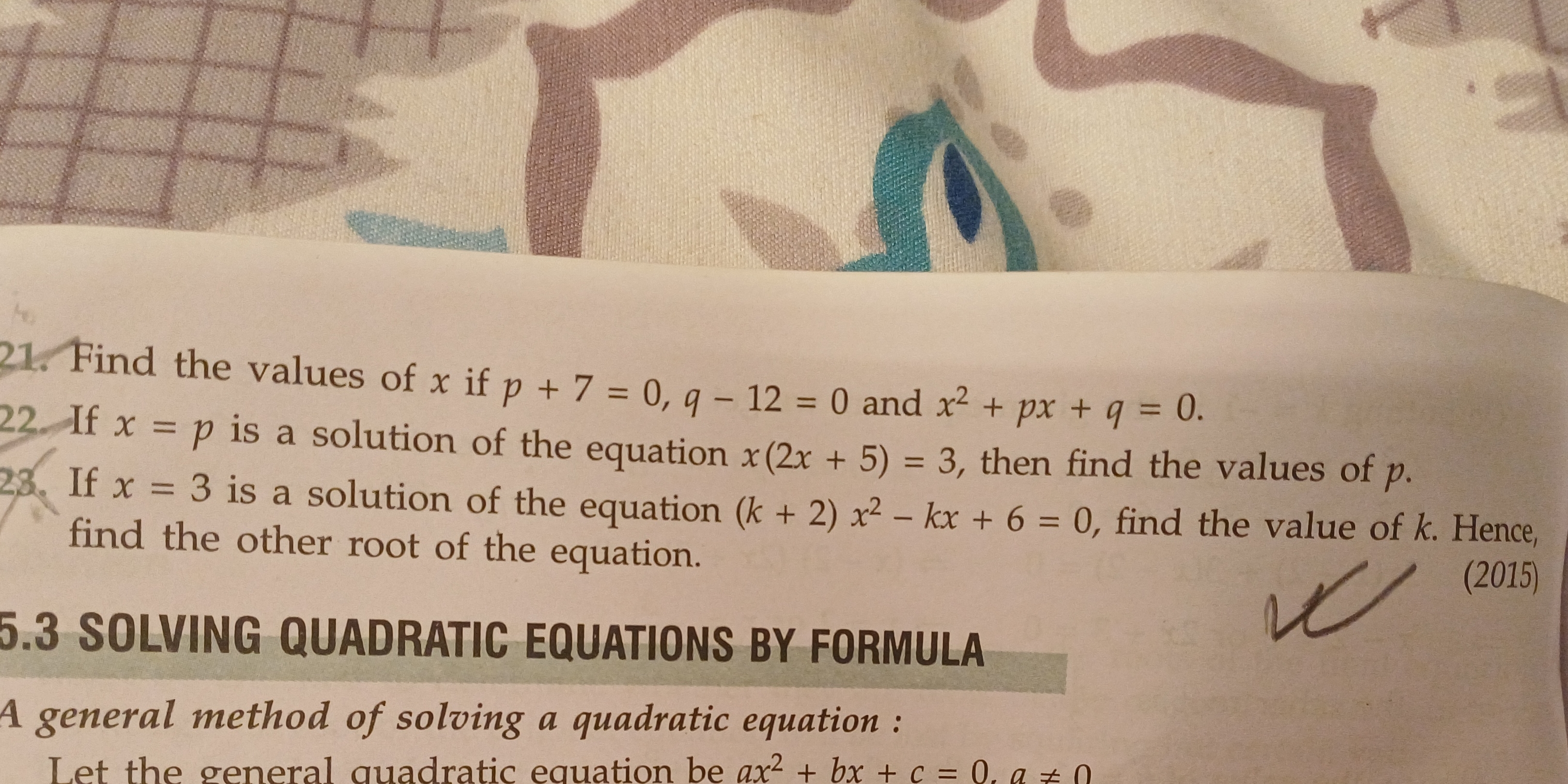Find the values of x if p + 7 = 0, q - 12 = 0 and x^2 + px + q = 0. If x = p is a solution of the equation x(2x + 5) = 3, then find the values of p. If x = 3 is a solution of the e... Find the values of x if p + 7 = 0, q - 12 = 0 and x^2 + px + q = 0. If x = p is a solution of the equation x(2x + 5) = 3, then find the values of p. If x = 3 is a solution of the equation (k + 2)x^2 - kx + 6 = 0, find the value of k. Hence, find the other root of the equation.

Understand the Problem
The question is asking to solve a set of equations involving variables, specifically to find the values of x, p, and k based on the equations given. It presents two scenarios where certain values of x are solutions to specific equations, and requires manipulation of these equations to find the unknowns.
Answer
\( p = \frac{1}{2} \text{ or } -3, k = -4, \text{ other root } = -1 \)
Answer for screen readers
The values are ( p = \frac{1}{2} ) or ( p = -3 ) and ( k = -4 ). The other root is ( -1 ).
Steps to Solve
- Find the value of ( p ) using the first equation
We start from the equation ( x(2x + 5) = 3 ).
First, we set this equation equal to zero:
$$ x(2x + 5) - 3 = 0 $$
This leads to:
$$ 2x^2 + 5x - 3 = 0 $$
- Apply the quadratic formula
To solve for ( x ), we can use the quadratic formula, which is given by:
$$ x = \frac{-b \pm \sqrt{b^2 - 4ac}}{2a} $$
For ( 2x^2 + 5x - 3 = 0 ), we have:
- ( a = 2 )
- ( b = 5 )
- ( c = -3 )
Plugging these into the quadratic formula, we calculate:
$$ b^2 - 4ac = 5^2 - 4(2)(-3) = 25 + 24 = 49 $$
Now substituting back:
$$ x = \frac{-5 \pm \sqrt{49}}{2(2)} = \frac{-5 \pm 7}{4} $$
This gives two values:
$$ x_1 = \frac{2}{4} = \frac{1}{2}, \quad x_2 = \frac{-12}{4} = -3 $$
Since ( x = p ), we conclude that: $$ p = \frac{1}{2} \text{ or } p = -3 $$
- Finding the value of ( k )
Now, for the second part, we need to substitute ( x = 3 ) into the equation ( (k + 2)x^2 - kx + 6 = 0 ):
$$ (k + 2)(3^2) - k(3) + 6 = 0 $$
This simplifies to:
$$ 9(k + 2) - 3k + 6 = 0 $$
Expanding:
$$ 9k + 18 - 3k + 6 = 0 $$
Combining like terms:
$$ 6k + 24 = 0 $$
Solving for ( k ):
$$ 6k = -24 $$
Thus,
$$ k = -4 $$
- Find the other root of the quadratic equation
Using the first root ( x = 3 ) and ( k = -4 ), we can now find the second root by applying Vieta's formulas, which tells us that for a quadratic of the form ( ax^2 + bx + c = 0 ), the sum of the roots ( r_1 + r_2 ) is given by ( -\frac{b}{a} ).
In our case:
- ( a = k + 2 = -4 + 2 = -2 )
- ( b = -k = 4 )
So:
$$ r_1 + r_2 = -\frac{4}{-2} = 2 $$
Knowing one root ( r_1 = 3 ):
$$ 3 + r_2 = 2 $$ Thus,
$$ r_2 = 2 - 3 = -1 $$
The values are ( p = \frac{1}{2} ) or ( p = -3 ) and ( k = -4 ). The other root is ( -1 ).
More Information
We found two potential values for ( p ) from the quadratic equation. The value of ( k ) and the other root of the quadratic equation were derived from substituting a value into the quadratic formula.
Tips
- Miscalculating the discriminant or incorrectly applying the quadratic formula.
- Forgetting to simplify the quadratic equation to standard form before solving.
- Not properly substituting values when solving for roots.
AI-generated content may contain errors. Please verify critical information